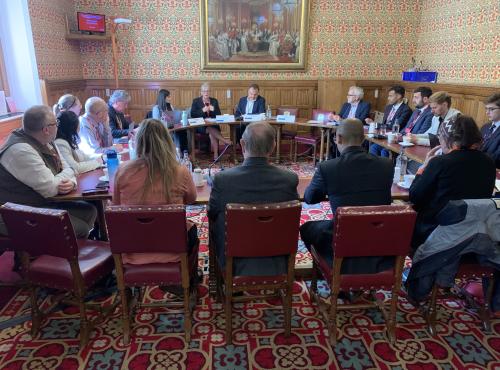Energy Security: Protecting Vulnerable Households
On 21 November, Policy Connect, through its low carbon-energy forum Carbon Connect, held the second roundtable in the Energy Security series. The session focussed on the affordability challenge sparked by the energy crisis and participants discussed the role of a social tariff and other support schemes in protecting vulnerable households this winter and coming winters. Looking forward, participants also discussed the long-term policy changes needed to improve consumer affordability and energy security.
The event was chaired by Alan Brown MP. Introductory remarks were made by Peter Smith, National Energy Action and Alexander Belsham-Harris, Citizens Advice.
Since the energy crisis began, an additional 2 million households are in fuel poverty, energy bills are on average £800 higher than they used to be, and energy debt has reached record levels and continues to rise. This is a deeply worrying context for vulnerable households who have resulted in taking unsustainable actions, such as switching off their heating in winter.
These figures showcase the severity of the situation at hand which will be further exacerbated in January as Ofgem has officially announced a 5% rise in the energy price cap for the next quarter. Participants expressed there is a greater need for financial assistance this winter compared to last winter, yet there was no support outlined in the 2023 Autumn Statement. It is imperative that policy makers are engaged in this topic to ensure vulnerable households are protected from high energy bills.
Key Takeaways:
- Call for targeted bill support, whether that is in the form of a social tariff, a refined Warm Home Discount, or an alternate support scheme. Government needs to offer meaningful support to vulnerable households, one which provides deeper price protection and is UK wide.
- In the 2022 Autumn Statement, the Government announced a new approach to consumer protection, including the option for a social tariff, to be enacted in April 2024. However, since the announcement a year ago, there has been no consultation published. Participants addressed the necessity of having a public consultation in order to design an effective social support scheme, including clarity on eligibility, funding, and delivery.
- The Government must incentivise landlords to ensure energy efficiency is prioritised to keep homes warm and safe. This needs to be supported through regulation, more funding, and wider public awareness.
- There needs to be a greater focus on reforming the energy market to ensure benefits to consumers are delivered promptly, costs are reduced, and innovation is incentivised to make energy markets better for consumers.
- Policymakers need to go further and faster to achieve the established net zero targets. This includes more funding and resources, and better advice and awareness around smoothing the transition for households.
For more information, please contact alainah.amer [at] policyconnect.org.uk (alainah[dot]amer[at]policyconnect[dot]org[dot]uk).



